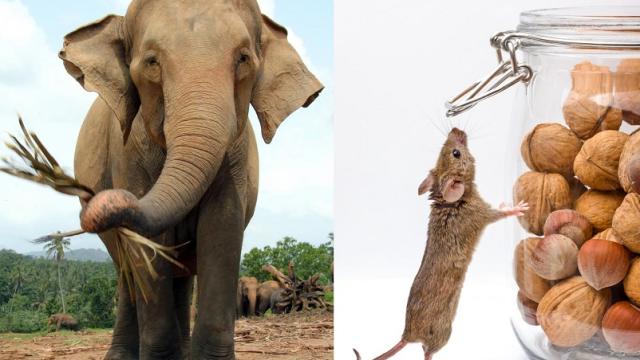A mouse’s sperm is much, much larger than an elephant’s sperm. A fruit fly produces the longest sperm known to science. Why do tiny animals make big swimmers, but large animals make small ones?
There are competing ideas about why sperm size differs among animals. One idea holds that small animals and large animals have wildly different metabolic constraints. Small animals with high metabolisms are better able to produce new sperm cells than large animals that form new cells more slowly.
The other idea has more to do with the female than the male. If a sperm is trying to swim into a elephant’s uterus, it has a longer journey than it has when swimming into a mouse’s uterus. An extra millimetre or two of tail isn’t going to help. If a male wants a shot at impregnating a big female, he has to produce as many swimmers as possible.
Ideally, each male would produce a huge amount of impressively big sperm. Nature isn’t that generous. The bigger each sperm gets, the less sperm there are in each batch of ejaculate. This provides scientist with an observable difference between the two theories. A creature with a fast metabolism, like a mouse, has few constraints, especially on the number of sperm they produce. Larger animals with low metabolic rates have more constraints on the number of sperm they can produce, and so should have a smaller number of long sperm, relative to body size.
That’s not what happens. As animals get bigger, they produce more and more sperm, sacrificing size to maximise numbers. This indicates that metabolism has nothing to do with sperm length — only size does. A mouse’s sperm is larger than an elephants because nearly all of a mouse’s sperm cells are likely to arrive at their intended location. Making the mouse’s sperm longer cuts down on the time it takes to get there — especially if that mouse’s sperm is in a competition in with another mouse’s sperm. An elephant’s sperm has very little chance of making it to the egg no matter how long it is. The elephant sacrifices the sperm’s length in order to produce so many sperm that at least one will get to the egg.
So size matters for animal sperm — just not in the way you might think.
[Source: Sperm number trumps sperm size in mammalian ejaculate evolution]
